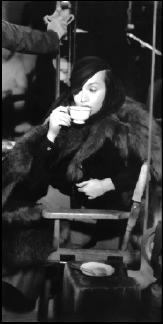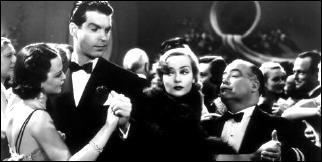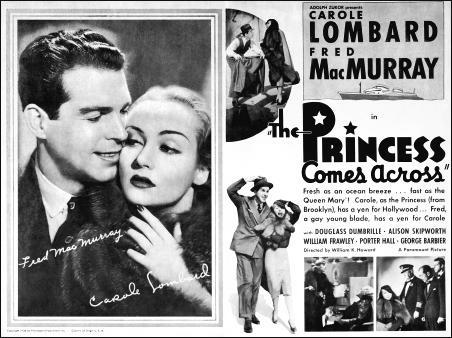Sat 15 Aug 2009
A Movie Review by David L. Vineyard: THE PRINCESS COMES ACROSS (1936).
Posted by Steve under Films: Comedy/Musicals , Mystery movies , Reviews[5] Comments
THE PRINCESS COMES ACROSS. 1936. Carol Lombard, Fred MacMurray, Douglas Dumbrille, Alison Skipworth, William Frawley, Sig Ruman, Porter Hall, Misha Auer. Screen story: Philip MacDonald, based on the novel The Duchess by Louis Lucien Rogger. (The latter may not exist in book form.) Director: William K. Howard.

Why they insisted on putting Carol Lombard in dramas is one of the great unexplained mysteries of Hollywood. She was born for screwball comedy, and graces some of the highpoints of the genre from Hawks’ Twentieth Century to Wellman’s Nothing Sacred, to the divine Lubitsch’s To Be Or Not To Be.
The Princess Comes Across isn’t quite in that illustrious company, but it’s close. The title alone is worth the price of admission.
Lombard is a would-be actress, Wanda Nash of Brooklyn, who went to Europe and got nowhere. She plans to cash in and hit New York big, though, by pretending to be a mysterious princess, Olga of Sweden, a Garbo-like figure sure to have the press in a frenzy by the time she hits New York.
What she hadn’t counted on was a romantic bandleader in the person of Fred MacMurray as King Mantell, and murder on the ship home. The result is a delightful comedy-mystery that sometimes gets lost among the surfeit of films in that genre from the same era.
Lombard made several films with MacMurray, and allegedly complained she wasn’t getting bigger stars as leading men, but the two are a good team, and if Fred was still a fairly minor leading man at this time, he wasn’t that far off from the films that would propel his career to major star status.
He has an easy-to-take quality that made him ideal for these roles that could have been either dull or strident in lesser hands. MacMurray manages to hit all the right notes, and compliments Lombard as well as bigger name leads like Cary Grant, John Barrymore, or her husband Clark Gable. He was one if the stalwarts of the screwball comedy genre in his own light.

The voyage is a hardly a vacation for anyone. There’s a blackmailer on board targeting Wanda and others, a killer who has taken the identity of one of the other passengers, and to add insult to injury, a convention of international detectives headed for New York.
Poor Wanda couldn’t have picked a worst boat for her trip. Then too she is falling for bandleader MacMurray, the last thing she needs in her life — a musician.
Of course with a mix like that, it’s only a matter of time until a body shows up and sets those nosy professional sleuths to sleuthing, and when their attention turns to Princess Wanda and King Mantell, they have no choice but to turn detective themselves to unveil the real blackmailer and killer.
Dumbrille and Ruman are among the police officers, Inspector Lorel and Steindorf. The set-up reminded me a little of C. Daly King’s novel Obelists at Sea, in which a convention of psychiatrists on a cruise all play detective while New York police Captain Michael Lord keeps his silence and tracks down the killer.
Like all good screwball comedies, the lines flow fast and furious, and the mystery is played for laughs, but with some genuinely spooky moments at night in the inevitable fog as Lombard tries to elude the killer.

Everyone is at the top of their form, and despite all a list of six screenwriters (four credited, two not, including J. B. Priestley), the script holds together extremely well, thanks to Philip MacDonald’s succinct adaptation of Rogger’s novel. (If you ever wondered exactly what the screen story was in relation to the screenplay, this is a good example where a strong story holds together all the disparate contributions of an army of screenwriters.)
We can be fairy certain it is MacDonald who keeps the mystery element in focus, while the comedy spins off of it. That said, I’d love to know what British novelist J. B. Priestley’s contribution was. He was no stranger to mystery and suspense or comedy in books or plays.
The comedy mystery was a specialty of this era: The Thin Man, Bulldog Drummond Strikes Back, The Mad Miss Manton, Arsenic and Old Lace, Whistling in the Dark, Slightly Larcenous, Grand Central Murder to name just a few, and it mixes well with the screwball school.
The high point was likely W. S. Van Dyke’s It’s A Wonderful World and George Marshall’s antic Murder, He Says, but Princess is no slouch, and Lombard and MacMurray are both genuinely attractive and believable.
Somehow this one has been neglected, but it doesn’t deserve that fate. It’s one of the brightest moments of the comedy mystery film at a time when these were being made with all the skills the studio system could bring to bear. The Princess Comes Across, and delivers, a jewel of a comedy mystery.

August 16th, 2009 at 1:02 pm
I bought the set of Lombard films which this was in and it was clearly the best. One part I remember is that they said the escaped murderer on the ship had, at one time, escaped disguised as a woman. I don’t want to give away who that is for those who haven’t seen it but it is hard to believe that anyone could think he was a woman.
August 16th, 2009 at 9:33 pm
I agree Ray, but then Lionel Barrymore pulled it off in The Devil Doll, so I guess anyone can.
August 17th, 2009 at 11:33 am
The thing about Barrymore in The Devil Doll is that if anyone looked at the old woman’s (Barrymore) chest they might have noticed that “she” didn’t have any breasts.
August 17th, 2009 at 1:08 pm
Damn, Dave, you make this thing sound tasty!
Veteran nasties Dumbrille & Rumann as cops?!?
I’ll look for this one again….
January 21st, 2016 at 11:10 pm
It took a while, but I’ve finally seen this one. And I enjoyed it. Reading David’s review, I see that I needn’t review it myself. He may have liked it more than I did, but David, you didn’t say anything I disagreed with..
One key sentence in what he says above sums it up for me:
“We can be fairy certain it is MacDonald who keeps the mystery element in focus, while the comedy spins off of it.”
Nicely done, all around.